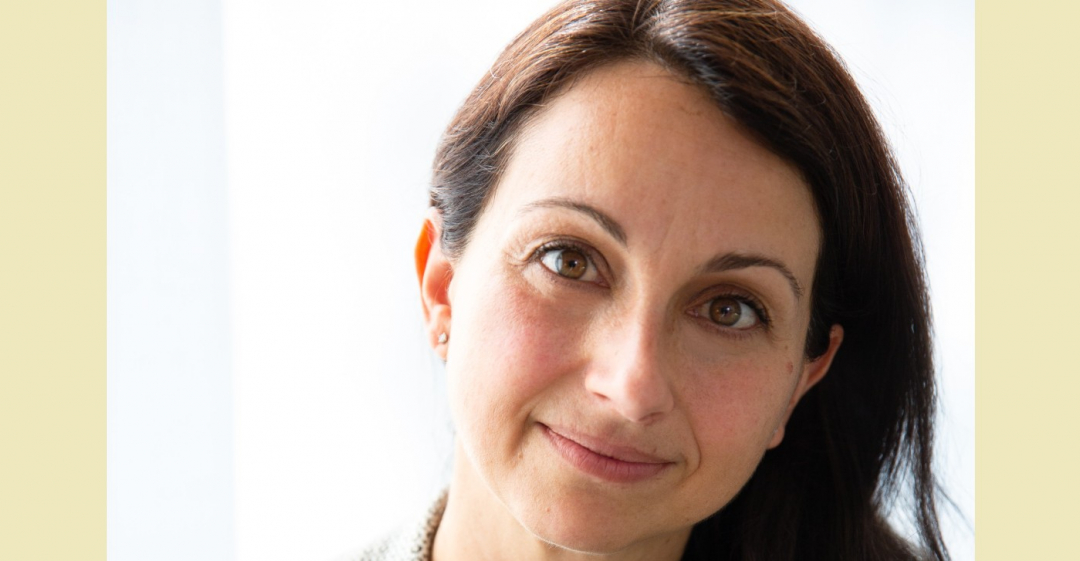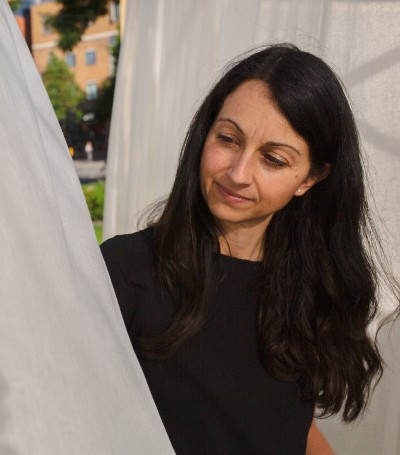“I felt like I was wearing a mask that didn’t fit me, pretending to care about things I didn’t care about anymore.”

What work were you doing previously?
I spent years hiding behind a glittery international management career in the advertising sector.
I worked for some of the biggest brands and marketing agencies in the world.
What are you doing now?
I’m a professional artist.
Under the name of Immuto (latin for ‘I transform’), I create immersive installations and narratives to explore human connections in collaboration with other cross-discipline artists and scientists.
My most recent collaborative artworks include Once Upon Us (with Queen Mary University and London Festival of Architecture on the themes of epigenetics and ancestral memory), and Invisible Labyrinth (with Spazio Leonardo Milan and UNA gallery on our evolving social dynamics).
I’ve also started to create courses and online communities to help other people live a more creative and expansive life. In them I share the most powerful tools that have helped me to reconnect with my heart’s dream and act on it.
Why did you change?
My previous career was very successful on the outside, but not so much on the inside.
I felt like I was wearing a mask that didn’t fit me, pretending to care about things I didn’t care about anymore.
I was taken aback by the sight of a bitter and resentful face staring at me. Could the person in the mirror really be me? I’d seen the same expression on the face of the women of my family too many times already, but never on me before.
Where had gone the bundle of joy I used to be? Had my mum undergone the same transformation? Could this be passed on to my then three year-old daughter?
I knew at once that something had to change. And fast.
I wasn’t sure of what I wanted to do, but I knew how I needed to feel – I needed to feel more like myself.
How did you choose your new career?
I’ve wanted to make art for as long as I can remember, but I believed I wasn’t good enough.
So, I pushed my creativity back inside until I almost imploded. I got to the point I'd no choice but exploring what was calling to me so strongly.
Are you happy with the change?
Yes.
Being able to call myself an artist is a dream come true.
And acting on my heart’s dream has unlocked so much in other areas of my life too. I feel that with every new step I take I’m just letting go of another unnecessary layer. The name of the game is not self-development but self-discovery.
I don’t know what is next, but I can’t wait to find out.
What do you miss and what don't you miss?
I had some amazing experiences and met wonderful people in my previous career that taught me a lot.
What I miss the most from my office time is the financial ease that came with it. I could be sick or show up half-heartedly and still receive a full salary at the end of the month.
I don’t miss having to sell ideas I didn’t believe in.
How did you go about making the shift?
To be honest, I was so lost I didn't know where to start.
I wish I could say I immediately understood what needed to change, and in a single moment decided to quit everything that was not serving me to become the best embodiment of my true life values.
Instead, I went on a hunt for inspiration and transformation everywhere I could think of, including people, having encounters mostly wonderful and always insightful.
I’ve always been sensitive to the transformational power of books, and quickly moved from self-development sceptic to self-development junkie.
And I explored different tools, some resonating more than others.
In hindsight, it now seems evident to me that I’d been on the point of imploding because I was forbidding myself to let my creativity out and honour my life-long dream of being an artist.
However, I could not see this then and had to go through quite some bumps before I could understand, accept and act on this simple truth.
How did you develop (or transfer) the skills you needed for your new role?
In the marketing agency world I learned that the best creativity is the result of a collaborative effort.
Different people and perspectives can add immense value to each project. As a result of this, I now enjoy and treasure diverse collaborations.
Planning, communication, budgeting and other project management tools have come in very handy too.
What didn’t go well? What wrong turns did you take?
There are no wrong turns when you start exploring and experimenting.
Discovering what doesn’t work becomes as valuable as discovering what works, even if it’s not nearly as enjoyable.
However, looking back I realise that I’d have saved time and energy by trusting my own knowledge and intuition more, instead of deferring to other people who I thought were wiser than me.
How did you handle your finances to make your shift possible?
My previous career paid well, so at the beginning I had some savings I could rely on.
Because the income coming from my artistic practice is still hardly predictable, I continue to leverage my marketing experience to freelance as a communication consultant, now in the arts sector.
And getting my initially sceptical husband on board has been key as well. I feel lucky to know that he has my back when things get tough.
What was the most difficult thing about changing?
The most difficult thing was to believe in myself and in my dreams, instead of thinking I was going crazy.
Especially at the beginning, when my new career path was still far from clear, my friends and relatives kept wondering what was wrong with me – and I did too. I had a beautiful family and a beautiful life in a beautiful city. And a stellar job as well!
How could I want to quit that?
What help did you get? 
Early in my shift I stumbled across a community of women who were coming together every month to support one another while creating a bigger life for themselves.
I immediately felt that there was something very special in the coming together of women ready to share hopes and laughter, obstacles and tears.
Those monthly meetings soon became an important part of my journey, because sometimes a safe holding space and a new idea is all somebody needs to pick herself up again.
What I learned from this wonderful experience is now woven into my own Inner Artist Tribe online community and its monthly gatherings.
What resources would you recommend to others?
There are many great resources out there but there’s nothing more empowering than finding your own tribe.
Connecting with like-minded people, with the specific intention to grow together in a safe and supportive space, will ensure you don’t quit your dreams even when things get difficult and you feel stuck or lost.
What have you learnt in the process?
I’ve learned to trust and act on my dreams, baby-step after baby-step.
I’ve come to believe that if a dream comes to me again and again (despite my efforts to dismiss it as ridiculous or impractical), it’s because I’m meant to walk towards it. The dream may change as I progress, but the initial direction will prove to be the right one.
I’ve also discovered that proceeding baby step after baby step is usually the best way forward, and that obsessing about giant steps can be a form of self-sabotage.
I've learned to walk through my fears. There’s a famous children's story that goes at every turn: ‘We can’t go over it. We can’t go under it. Oh no! We’ve got to go through it!’.
I’ve found it to be the same with my fears – they inevitably get triggered when I make a move towards my dreams and there’s no way of getting over or under them… I’ve got to go through them. I now know that, if my fears go wild, more likely than not I’m on the right track.
I've learned to embrace the cycle. I love action and when things seem to get stagnant, I tend to stubbornly try to get them moving even when they can’t. However, when I look back, I understand how every single pause I experienced was essential, to either recharge or realign.
So when things seem to slow down, I now check in with myself if it’s a call for me to rest or re-assess.
What do you wish you'd done differently?
I wish I’d have asked for more help.
I used to think that I should be able to figure things out on my own. Or that I should at the very least explore all possible solutions before asking for as little help as possible. Somehow that seemed the right and honorable thing to do, like there was a special medal for the ones who asked for no help.
I've now learned that the real gold is in asking myself ‘Is there anybody or anything else that could help me with this?’, as I gratefully set about making the next step of my journey as comfortable as I possibly can.
What would you advise others to do in the same situation?
Learn how to hear and trust the whispers of your heart.
It will bring you to your very own joy.
To find out about Francesca's creative community, visit https://art.immuto.art/tribe-inner-artist
What lessons could you take from Francesca's story to use in your own career change? Let us know in the comments below.



